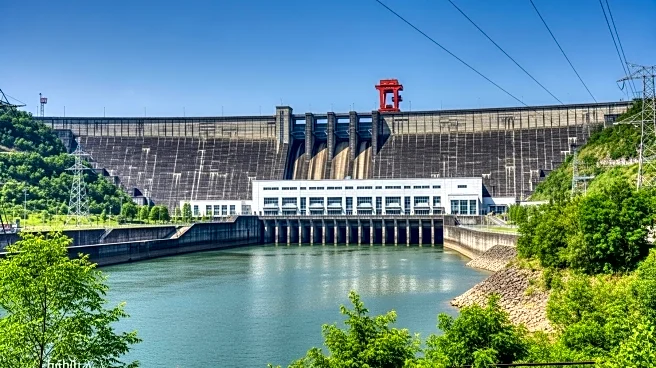What's Happening?
Ethiopia has officially inaugurated the Grand Ethiopian Renaissance Dam (GERD), Africa's largest hydroelectric dam, on a tributary of the River Nile. The $5 billion project aims to provide energy to millions of Ethiopians and export surplus power to neighboring regions. However, the dam has been a source of tension with Egypt, which fears it could restrict its water supply during droughts and lead to the construction of other upstream dams. Egypt relies on the Nile for 90% of its fresh water and has opposed the dam, citing violations of water treaties and existential threats. Despite these concerns, Ethiopia has proceeded with the dam's development, asserting its sovereign right to build on its territory.
Why It's Important?
The inauguration of the GERD marks a significant milestone in Ethiopia's economic development ambitions, potentially transforming the country's energy landscape and boosting its economy. However, the project has heightened geopolitical tensions in the region, particularly with Egypt, which views the dam as a threat to its water security. The situation underscores the complex interplay between national development goals and regional resource management, with potential implications for diplomatic relations and regional stability. The dam's completion could also influence future infrastructure projects and energy agreements in Africa.
What's Next?
Ethiopia plans to continue filling the dam's reservoir in phases, while Egypt has vowed to monitor developments closely and take measures to protect its interests. The ongoing dispute may lead to further diplomatic negotiations or international mediation efforts to reach a legally binding agreement on the dam's operation. Additionally, Ethiopia's success with the GERD could inspire other African nations to pursue similar large-scale infrastructure projects, potentially reshaping the continent's energy landscape.
Beyond the Headlines
The GERD has become a symbol of national unity in Ethiopia, rallying support across ethnic lines amid internal conflicts. The project highlights the broader challenges of balancing development with environmental and geopolitical considerations. It also raises questions about the role of international law in resolving transboundary water disputes and the potential for collaborative resource management in the Nile Basin.











